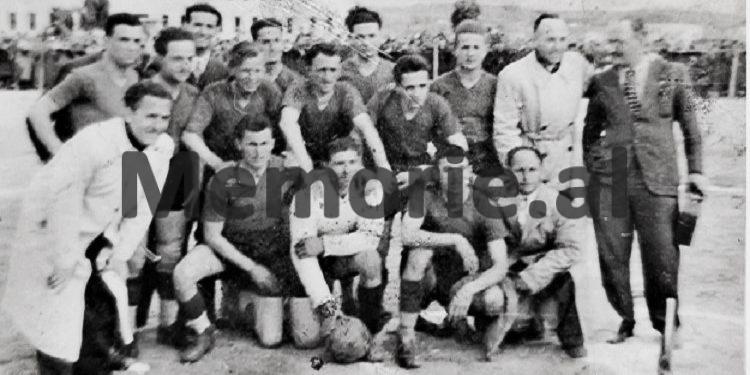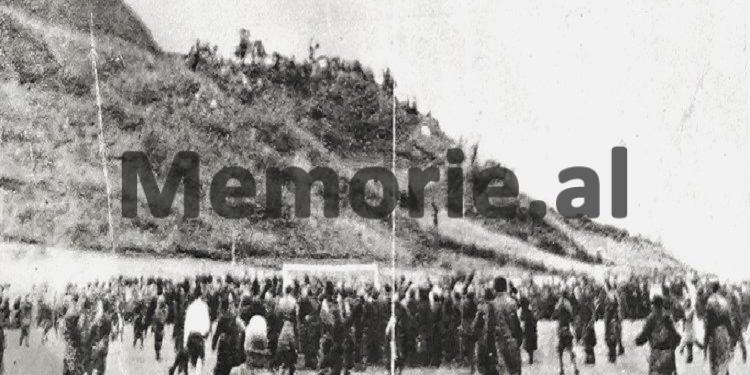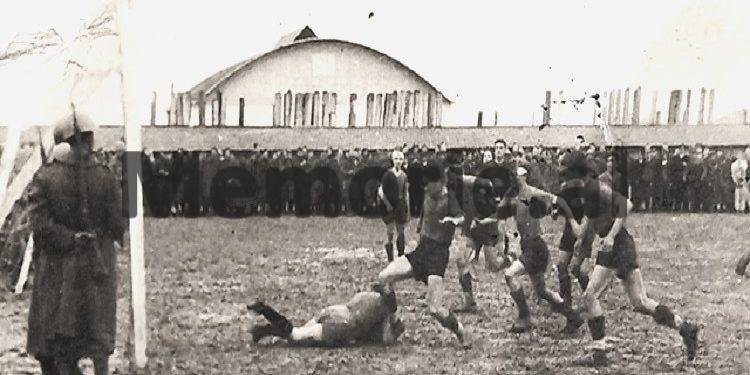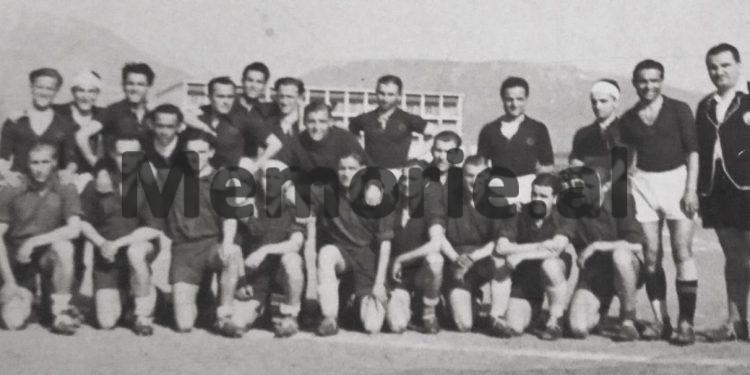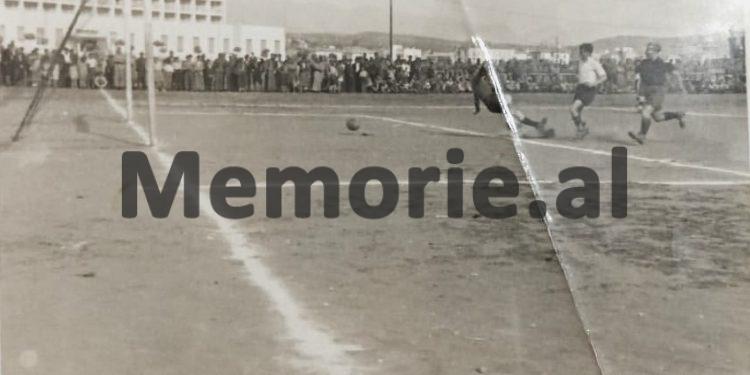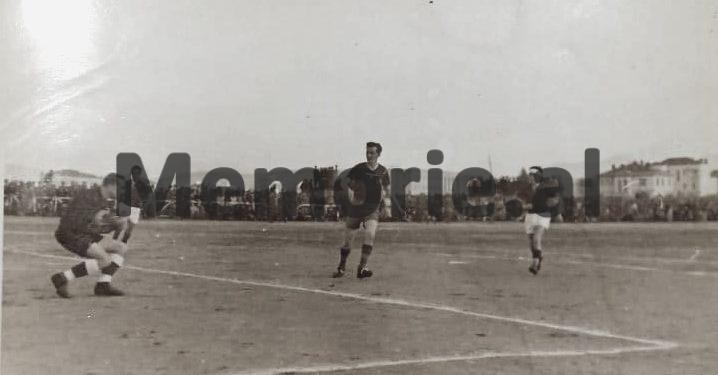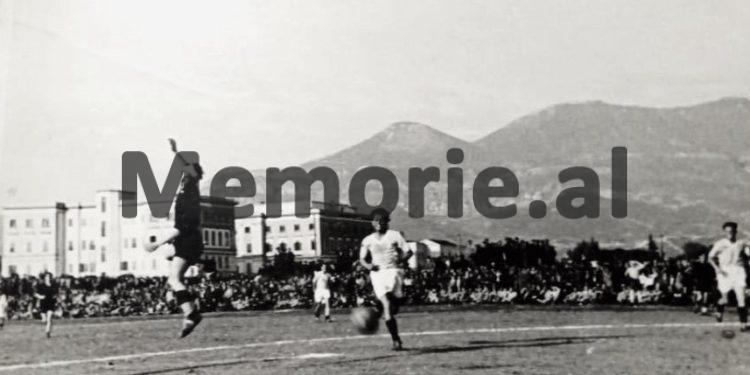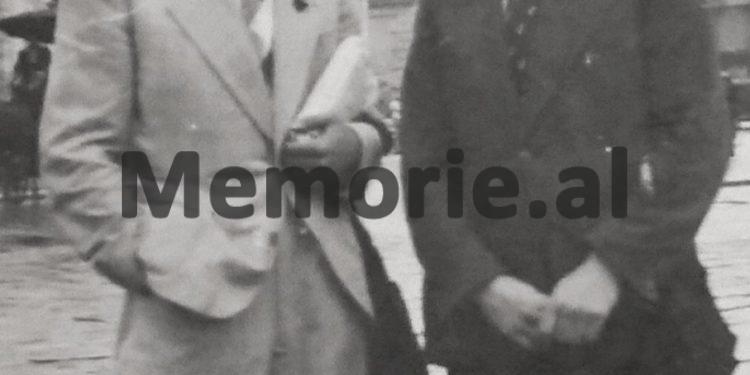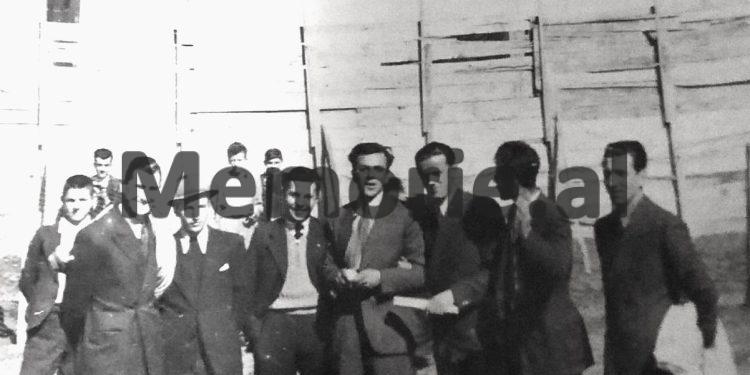By Dashnor Kaloçi
The rare testimony of Arif Peza, former football player of the Albanian National Team and commander of a “National Front” gang, who left in 1944 to escape the communists and returned to Tirana, at the beginning of the years 90th
Second part
Memorie.al / On this eve of the match of our national football team with the Italian representative, which will take place on Saturday, June 15 at 21.00, the arena “Signa Iduna Park”, in Dortmund, not only those hundreds and hundreds of Albanians who they will be lucky enough to follow him from the steps of the stadium, or hundreds of thousands of others from all over the world through the TV screen, but even many of the sports journalists, researchers, historians, statisticians, etc., do not know that; in addition to those four meetings (two official and two friendly), which the Albanian national team has had with its neighbor across the sea, Italy, several times World and European champion as well, there was another match, when, an Albanian national team, developed at the Lazio stadium in Rome, a full 79 years ago, in August 1945. This fact, that is, a match of an Albanian national football team against an Italian team, even one of the strongest in the Serie A championship at that time, as was Lazio, comes through the rare testimony of one of the main protagonists of that match, Arif Peza, former footballer of the “Shprefeja” team of the capital and also of the Albanian National Team, from the period of the country’s occupation, 1939 – 1944.
Somewhere from August 2006, when we met him, he was the only former football player of the pre-war Albanian national team, who was still alive! Even with a brilliant memory to be envied and also from the state of health, even though it was close to the 90s.
Arif Peza, of early origin from the well-known village of Tirana, from where he inherited his surname, who in the late 30s, had studied at one of the military schools in Italy, at the beginning of the years 90s, he returned to his homeland, to his hometown, Tirana, from a long emigration of almost half a century.
In 1940, after returning from Italy, where he was interned in a camp in Santa-Fara, for the reason that he had not agreed to take the oath as a military student in front of the Italian flag, he became active with the well-known football team of Tirana, baptized with the name “Shprefeja”, which was also the core of the Albanian national team, in those years of the fascist occupation of the country.
Two years later, he was forced to abandon the green fields and also his passion for football, after he went to the mountain with a gun in hand, even being the commander of one of the armed squads of the nationalist organization “Balli Kombëtar”, which they operated at that time in the villages in the western area of Tirana, such as Peze, Vorë, Preze, etc. Political circumstances forced him, in November 1944, to leave Albania and settle in the camps of Italy, (which UNRRA had just opened), together with many leading nationalist exponents of the “National Front” and “Legality”.
Even though in extremely difficult living conditions for us and foreigners, both economically and politically, he and some other friends, former football players of the Albanian national team during the period of the Monarchy and that of the War, (1939-1944 ) did not easily forget their passion for football, which they started as children, when they played barefoot in the alleys of Tirana, just like all other peers of that time and later.
Thus, in August 1945, they organized a football match with the well-known Italian team of Lazio, in Rome, which Arif Peza would tell us in detail, in an exclusive interview, which we are publishing in full. in this article. Likewise, he made available to us for publication some of the rare photos of that meeting, which never saw the light of publication before the 90s, since communist historiography could never allow the National team to football, to represent “war criminals” and “enemies of the people”, as the communist regime of Enver Hoxha and his successor, Ramiz Alia, had labeled them for almost half a century.
Arif, during those three or four years that you stayed in those camps, did you have the chance to play any other football matches with the Italian Serie A teams?
It was the first and last meeting that we had the opportunity to play with the Italian teams. But during that time, we continued to play football and played matches with some Italian localities and we always won.
What about the Albanian footballers who were active in those years in Italy, like; Loro Boriçi, Naim Kryeziu, Riza Lushta, etc., did you have a chance to meet later during your long emigration to the West?
Apart from Loro Boric, who was in Albania, I met almost everyone else, and in particular Riza Lushta, with whom I had a great friendship and I met with him until the beginning of the 90s.
After leaving football in Italy, Rizai came to the USA and settled in Bridgeport, where he worked in a factory. He hung out with a group of Albanians and occasionally came to New York to meet his close friend, Halim Begeja, and they both came to the bar where I worked.
Rizai was a very good and very grateful man. In addition to the Albanian political emigrants who were in the West, he also maintained contact and correspondence with Selman Stërmas, who was in Albania, to whom, as a sign of gratitude, for what Selman had done for him, there from the beginning of the 70s- sent him a television in Tirana by mail.
Arif Peza: “With ‘Shprefeja’, we beat the Italian teams in Tirana”
Arif Peza, the former player of the Albanian national football team during the occupation of the country (1939-1944), except for the match held in August 1945, where he, together with several other escaped Albanians, as well as some Albanian students who studied in Italy, Austria, etc., formed a team and played a match against Lazio in Rome, in his testimony, he also told us about the football activities developed in Tirana, during the occupation of the country, 1939-1944, where he was a player of the “Shprefeja” team.
Regarding this, he recalled: “For the first time with the ‘Shprefesa’ team, which was a team that was formed by the fusion of two teams, ‘Shpresa’ and ‘Rufeja’, merging into one, I am activated and I played there for the first time since 1940.
That team, i.e. “Shprefeja”, represented the capital, Tirana, but in fact it was the National Team of Albania, not only because the best footballers in our country played there, but also due to the fact that at that time, the National Football Championship was suspended. , because of the war.
The coach of the “Shprefeja” team at that time was the well-known Besim Hamdiu (“Qorri”), while they were active as footballers; Halit Laçej (goalkeeper), Arif Peza, Prokop Myzeqari (later killed in the war, “Martyr of the Fatherland”), Fiqri Tartari, Rexhep Spahiu, Xhavit Demneri, Skënder Begeja, Maliq Petrela, Zyber Lisi, Ali Visha (later killed in the war, “Martyr of the Fatherland”, and Vasfi Biçaku.
Most of these footballers were from the capital, Tirana, but there were also from other cities in the country, such as; Durres, Shkodra, Kavaja, Elbasan, etc.
From 1940-’41, our team “Shprefeja” took part in a small championship, divided into three groups, where several Italian military teams also played, such as “Aeroneutika”, “Xenjo”, “Autoccento”, ” Medicine”, etc.
With the Italian team of Medicine, the well-known doctor, Dr. Pizzolio, of the Italian National Team, who at that time worked near the Military Hospital in Tirana.
The away matches, which were considered to be on our field, we held at the “Shallvara” field, in the center of the capital, while the away matches, we held at the “Ali Rizai Barracks” (“City of Students”), where the divisions of the Italian troops were concentrated.
That small football championship, at that time, greatly enlivened the lukewarm life of Tirana and had a great echo, not only in the youth of the capital, but in all layers of the population.
All the matches played were followed with great interest, not only by the passionate capital fans, who filled the steps of the few stands that existed there at that time, taking their seats a few hours before the match, but also by the soldiers and major Italian officers, of all types of weapons, that were deployed in Albania at that time.
Our team “Shprefeja” made an extraordinary appearance during all those matches, winning all the matches and reached the cup final of that tournament, or as it was called then, a small championship, as much as the conditions allowed of war.
The most beautiful and interesting match that we played was the one with the “Aeronautika” team, which took place at “Ali Rizai Barracks”, which we won with the result 3 to 2. I remember it like now, when two three hours before the start of the match, all the ardent fans of the capital lined up to “Ali Riza’s Barracks”, going there on foot, with bicycles or even with carts.
The goals from our team were scored by Skënder Begeşa (penalty), Vasfi Biçak and Zyber Lisit. The meeting was refereed by an Italian officer, Captain Sinika, (a well-known football referee in the Italian Serie A championship), who must be said to have judged the match fairly correctly and impartially.
After the match ended, the many spectators who were there, flooded the streets of Tirana, turning that day into a real party, and a group of passionate fans accompanied our team to one of the bars on the outskirts of the capital, to celebrated there with a party. After that meeting, we were going to face the “Autoccentos” team in the final, against which we were mentally and physically prepared to win, but we couldn’t do it.
The reason for the loss of that match was the absence of our three main players; Maliq Petrela, Ali Visha and Vasfi Biçakut, who were arrested by the Italian authorities, just two days before the match that was expected with great interest and without exaggerating at all, it must be said that in those days, it was the main word of every conversation that took place everywhere in Tirana.
Our whole team, led by the trainer, Besim Hamdiu, (“Qorri”), we went and asked the Prefect of Tirana, Mr. Qazim Mulleti, begging him to intervene for their release.
But despite the great interest of the Prefect of Tirana, the Italian authorities did not release the three players of our team, saying that they had made propaganda against Italy and that they had feverish communist ideas and activities.
All the matches that we played at that time in that small championship were very tense, but the peak of the incidents reached the match with the “Xenjo” team, where the Italian army was forced to enter the field several times, to calm the situation and to establish order. All matches were broadcast in real time by Radio-Tirana, under the commentary of the well-known Anton Mazreku.
After that small championship, where we took the second place, our team “Shprefeja”, held two or three more meetings, both in Kavajë and Durrës, and then with the representative team of Kosovo, which we won 1 to 0 , in Tirana.
These meetings were interrupted there from 1942, after most of us dispersed and went to the mountains with weapons in hand, creating the first nationalist and communist squads, according to the political convictions that each of us had for a long time, which had not hindered us at all, to have an excellent harmony within the team”. Memorie.al




